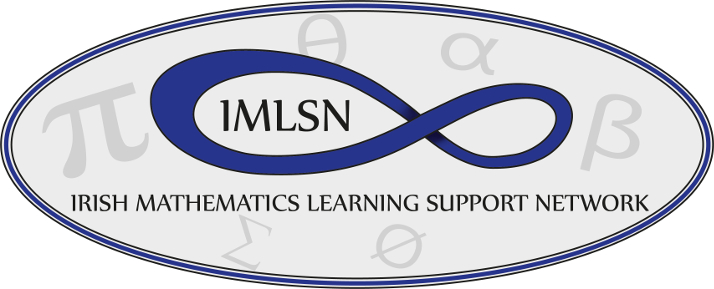Date: Friday 7th December, 2012.
Location: Queen's University, Belfast.
Workshop Theme: ‘Promoting Learning Support and Engagement with Mathematics: a discussion of all avenues of approach including the use of technology’.
The workshop was hosted by the Learning Development Service in Queen’s University Belfast.
Thanks to the generosity of the National Centre for STEM Education, the Irish Mathematics Society (IMS) and the IMLSN, there was no registration fee.
Workshop Report
Keynote Speakers:
The first keynote presentation was by Professor Sarah Moore of the University of Limerick.
Title: Student retention, performance and support: insights from learner support units within and across disciplines.
Abstract: We will discuss the pedagogical principles of engagement, efficacy, empowerment, sense of purpose. relevance, and confidence as access points to the cognitive requirements that give rise to student success, with a particular focus on the importance of maths and science across disciplines.
The second keynote presentation was by Dr. Paul Andrews from the University of Wales, Newport.
Title: Engagement with Mathematics using technology.
Abstract: This talk will showcase some of the many free and open source technologies which are available to educators and provide examples of how they are being used in education to: 1) Enhance the student learning experience 2) Increase collaborative research and income generation opportunities for staff 3) Reduce the administrative burden on staff and thus allowing them to focus more time and energy on teaching and the student learning experience.
The following is a video of the presentation.
Short talks:
The first short talk was by Julie O'Donovan (now Crowley) from the Cork Institute of Technology.
Title: Student engagement with Mathematics Support at Cork Institute of Technology.
Abstract: In this talk the operation of the support centre Cork Institute of Technology in the academic year 2011-2012 is described. In particular the changing profile of students attending is explored. The range and type of questions asked by students engaging with mathematics support at Cork Institute of Technology is outlined.
The following is a video of the presentation.
The second short talk was by Shazia Ahmed and Lorna Love from the University of Glasgow.
Title: Using Facebook to implement virtual PAL and promote deep learning.
Abstract: Having struggled with the logistics of implementing Peer Assisted Learning (PAL) sessions, we instigated and semi-moderated Facebook groups for two Level 1 courses: Mathematics and Computing Science. These succeeded in providing a space for virtual academic dialogue between classmates, senior students and support staff. We witnessed numerous fruitful conversations resulting from students discussing problems. Welcome additional responses appeared from senior students who were also members of the group. In the Mathematics group feedback has also been provided by the Mathematics support coordinator. In this paper we will discuss the structure of our Facebook groups and provide examples of collaborative learning.
The third short talk was by Jonathan S. Cole, Timothy J. Crawford and Mohammad S. Zubairi from Queen's University Belfast.
Title: Sustaining transition to university: intensive maths support for first-year engineering students.
Abstract: An introductory mathematics course for first-year aerospace and mechanical engineering students revises fundamental topics from A-level. Past experience has shown that students with non-traditional entry qualifications (such as National Diplomas) struggle greatly. With ten such students in the 2012/13 class, extra maths support sessions were arranged, each student having two one-hour sessions available each week. The students work through practice questions structured to correspond with lecture topics, and can bring mathematical problems from other modules, in an informal setting with significant one-to-one assistance. Attendance has been very variable: three have attended most classes so far, three have not attended any.
*Correspondence to: J. S. Cole, School of Mechanical and Aerospace Engineering, Queen's University Belfast, Belfast, BT7 1NN, Northern Ireland. E-mail:
The fourth short talk was by Maria Meehan of the School of Mathematical Sciences, University College Dublin.
Title: Using Video Examples to Support the Teaching of a First Year Business Maths Module.
Abstract: In this talk I will explain my motivation for introducing 'In-Your-Own-Time Video Examples' as a learning support in my first year Maths for Business module in University College Dublin. I will describe how I design and develop the videos on an iPad for uploading to Blackboard, and perhaps most importantly, I will emphasise just how easy it is to do! Finally, I will present both an analysis of student usage and student feedback on the videos.
The fifth short talk was by Janette Matthews of Loughborough University.
Title: The Evolution of Mathcentre.
Abstract: Developed in 2003, mathcentre has become an important provider of mathematics learning resources used by students, lecturers and mathematics support centres and receives in excess of 230,000 visits a year from worldwide users. The upgrade in 2009 saw the development of the mathcentre Community Project designed to enable high quality mathematics resources created elsewhere to be shared. In addition mathcentre has become a valuable repository of research papers and guides such as those from sigma developed for mathematics support professionals. This talk will review mathcentre today and describe the vast array of resources that are available.
The following is a video of the presentation.
The sixth short talk was by Sue Milne and Sarah Honeychurch of the University of Glasgow.
Title: Module Facelift: Engaging Student Technology Teachers with Maths.
Abstract: A long-established maths module is being reconstructed to replace obsolescent software and engage students. Previously, the learning material and assessment was provided via the CALMAT system, with some learning materials added to a Moodle course. It was seen by students as something to 'get through', and CALMAT is increasingly difficult to deliver, particularly off-campus. New resources for learning and assessment, many based on CALMAT, are now available online within Moodle. These, combined with use of the discussion forum and the Mahara e-portfolio, are improving motivation and engagement with the course.
A pdf of the presentation can be downloaded here. In addition, this pdf describes some of the assessment tools that can be used for maths.
The last short talk was by Lisa O'Keeffe & Dr. Olivia Fitzmaurice from the University of Limerick.
Title: The Use of Tablet Technology to Enhance Mathematics Learning Support at the University of Limerick.
Abstract: In January 2011, the Mathematics Learning Centre (MLC) at the University of Limerick (UL) initiated a collaborative project with world experts in mathematics learning support (Loughborough University and Swinburne University of Technology) to use tablet technology to enhance the support facilities provided by the MLC at UL. The project, entitled 'MathsCasts', involves the design and evaluation of mathematics screencasts to facilitate the mathematics education of all students pursuing mathematics intensive degree programmes in a climate where budget cuts are a fact of life and, as a result, the favoured one-to-one tuition in the drop-in centre is not as accessible as it was in recent years. The UL MLC aims to provide MathsCasts for all its students hence the MathsCasts are tailored specifically to UL mathematics modules. The MLC has spent over 10 years offering support in these modules hence is in a unique position in terms of specifically targeting our students' mathematical needs. The aim of this paper is to assess the uptake of this facility by UL students and evaluate the impact of the MathsCasts on UL students' mathematics education. Issues relating to the management of such a project and future directions will be detailed.
The following is a video of the presentation.
The Workshop concluded with Round Robin Presentations and Discussions on the Conference Theme, and the Annual General Meeting of IMLSN.

